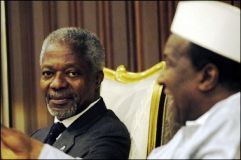AU says may hand over Darfur mission to UN
Jan 12, 2006 (ADDIS ABABA) — The African Union (AU) said on Thursday it may hand over its mission in Darfur to the United Nations, saying it was running out of money for the peacekeeping operation in Sudan’s troubled western region.

|
|
AU executive chairman Alpha Oumar Konare (R) speaks with UN Secretary General Kofi Annan (L) on his arrival at Addis Ababa, May 26, 2005. |
A report by the AU Peace and Security Council said funding for the mission — which costs $17 million a month to maintain — depended exclusively on the voluntary contributions by foreign partners of the 53-member body.
“At present, no commitment has been made by our partners for funding of the Mission beyond March 2006,” the report obtained by Reuters said.
“The time has come to make a pronouncement on the future of the AU Mission in Darfur and the ways and means to adapt it to the present challenges, including the hand-over to the United Nations at the appropriate time,” it added.
Last month Darfur rebels welcomed the prospect of the world body taking over from the AU, saying the pan-African body was doing a good job, but needed more troops, help with equipment and logistics, and a wider mandate to protect civilians.
About 6,000 AU soldiers are trying to stop escalating violence in Darfur, a desert region the size of France, with a mandate to monitor ceasefire violations but limited powers to intervene.
Taye-Brook Zerihoun, deputy special representative for Sudan of the U.N. Secretary-General, praised the AU’s work in Darfur.
“It is for the African Summit to decide and recommend to the U.N. Security Council to take over the operation in Darfur,” he said, referring to an AU meeting in Khartoum on Jan. 23-24.
“If this is done, the Security Council will consider the issue and will ask the Secretary-General to submit a report on how to proceed,” he told the AU’s Peace and Security Council, whose headquarters are in the Ethiopian capital.
U.N. MISSION
The United Nations established its Sudan mission of more than 10,000 peacekeepers and police in March last year to support a deal between Khartoum and southern rebels that ended more than two decades of civil war.
Zerihoun said the United Nations was concerned about deteriorating security in Darfur, which has seen a rise in banditry, inter-tribal clashes and armed attacks on villages and camps sheltering those fleeing the violence.
“Insecurity has also led to more instances of human rights abuse against civilians throughout Darfur,” he said.
“Field missions and investigations conducted by U.N. human rights officers have continued to document violations , including forced displacements, arbitrary arrest, prolonged detention, torture and the indiscriminate use of force during military operations.”
The Darfur conflict began in February 2003 when rebels launched an uprising against Khartoum, accusing the government of marginalising the impoverished area.
The government in turn dispatched Arab militias to put down the rebellion, but they have been accused of a campaign of rape, looting and murder.
(Reuters)
